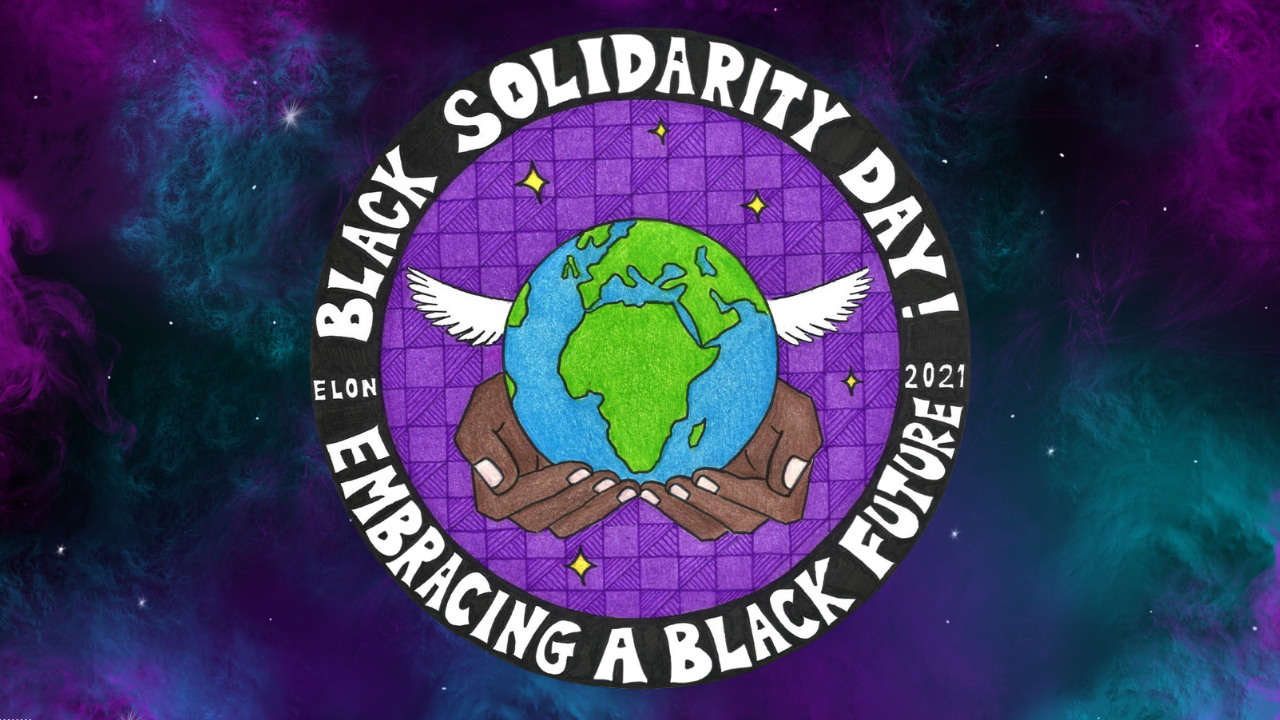The Center for Race, Ethnicity and Diversity Education’s 7th annual Black Solidarity Day Conference aimed to unite Black-identifying students, faculty and staff by exploring Black identity and intersectionality.
The Elon community joined in a day-long discussion and celebration of Black identity and culture, as the Center for Race, Ethnicity and Diversity Education hosted its annual Black Solidarity Day Conference on Feb. 26.
Black Solidarity Day was created by historian and Brooklyn College Professor Carlos Russell in 1969 as a demonstration of Black liberation. More than 50 years later, Elon hosted its seventh Black Solidarity Day Conference, themed “Embracing a Black Future,” to unite Black-identifying students, faculty and staff in an environment that fostered the exploration of Black identity, Black intersectionality and solidarity-building.

The day of virtual events included several opportunities for the Elon community to engage in discussions, meditation and thought. Attendees began the day with a pre-conference exercise class on Instagram Live and a grounding session led by Assistant Director of the CREDE John Robinson-Miller IV, who helped community members prepare their minds for a day of conversation and growth.
Elon President Connie Ledoux Book and Director of the CREDE and Assistant Dean of Students Tyrone Jean greeted conference attendees and highlighted the importance of the Black Solidarity Day Conference, as well as the opportunity to show solidarity through the university community.
Jean discussed the significance and meaning of Black Solidarity Day, speaking of Russell’s calls to reflect on the contributions of the many influential figures who have fought for solidarity throughout history. He discussed Russell’s call to action to better understand the impacts of centuries of oppression in Black communities and the importance of standing together as one.
“Most importantly, Black solidarity calls us to show up and show out for one another,” Jean said.
Book expressed the university’s commitment to making Elon an institution free of discrimination for Black students, faculty and staff, and touched on the value of events like the Black Solidarity Day Conference in making that a possibility.
“This day of education, celebration and reconciliation is a chance for all to explore how to improve the lives of our Black community members both here at Elon and globally,” Book said. “We are in solidarity with that goal.”
The day’s events included a series of discussions and presentations related to one of the conference’s seven pillars: Anti-Black racism; wellness in Black communities; socio-political activism; Afro-centric education; Blackness in a global context; Blackness and intersectionality; and looking toward a Black future. Students, faculty and staff broke out into a number of virtual sessions throughout the day to learn about a wide variety of topics.
In Career Services Fellow Alysia McGlone’s morning session, attendees learned about the journey to total wellness. In “Wellness in the Black Community: A Discussion of Avoidance and Vulnerability,” McGlone challenged the group to understand their own methods of avoidance and instances of vulnerability that might serve as obstacles to achieving total wellness. McGlone encouraged attendees to seek out strategies for coping with struggle in pursuit of wellness.
“It’s person-centered – one thing might not be for everyone,” McGlone said. “It’s an evolutionary process, so think about what might change for you in different circumstances and what adjustments you need to make in order to be resilient.”
In “Black (In)Action: How Committed Are You Really,” Assistant Director of Student Conduct Detric Robinson-Miller discussed the fight for social justice and focused on a central theme: “Silence is complicity, complicity is compliance.” Robinson-Miller’s presentation explored the ways in which complicity reinforces and reproduces anti-Black racism. He helped attendees understand how accountability nurtures equitable and inclusive cultures and discussed barriers and pathways to achieving accountable cultures.
On the topic of accountability, Robinson-Miller encouraged those who identify as allies not to place their personal comfort above their support for Black people. “There are very few instances where Black people are able to exist in a space comfortably when we think about our United States culture being one heavily influenced by white supremacy,” Robinson-Miller said.
Sessions also focused on topics of Afro-Latinx intersections, the roles of faith and religion in turbulent times, and poetry, among other things. As in years past, the conference also offered an allyship, anti-racism, and anti-Black racism track designed specifically for non-Black identified participants who wanted to learn more about anti-Blackness, oppression, power privilege and ways in which they can be better allies with Black communities.

In an exciting end to the seventh-annual conference, the community was invited to a keynote presentation by Carol Cunningham, vice president of consumer insights and business strategy at BET. Cunningham was introduced by Dean of the School of Communications Rochelle Ford and discussed the importance of recognizing and celebrating Black culture now and in the future. Cunningham, who also serves on the Elon School of Communications National Advisory Board, answered several questions from students about brand bravery, brands speaking out and the need for brands to value Black consumers.
“Imagine what it would be like if you could build brands that told these amazing stories where the content was focused on our achievement, the innovation and the excellence that we bring to the table,” Cunningham said. “What a different way people would see us.”



